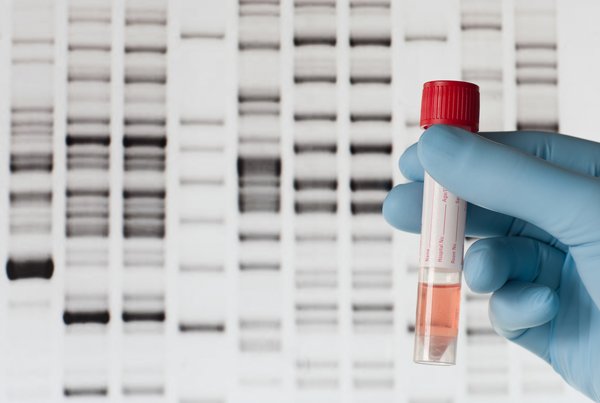CRISPR (clustered regularly interspaced short palindromic repeats) genome editing has been hyped for years. But the promise of CRISPR technology has yet to be fulfilled. That could change in the coming years, though. Major genomics breakthroughs -- and potentially explosive growth for some stocks -- could be on the way.

CRISPR companies forging the future
Several companies are using CRISPR to edit human genomes in an attempt to treat (and even cure) genetic diseases. Their therapies either use an ex vivo approach or an in vivo approach. With ex vivo therapies, genes are edited outside of the body.
But CRISPR's use isn't limited to only genetic diseases. Several gene-editing companies are also targeting various types of cancer. In particular, CRISPR is being used to develop chimeric antigen receptor T-cell (CAR-T) therapies where immune cells are genetically engineered to attack specific tumors.
In addition, some companies are using CRISPR for screening (which shouldn't be confused with genetic testing). With CRISPR screening, genes are edited in a way that makes them inoperative. CRISPR screening enables companies to discover which genes perform specific functions, which can be important in developing drugs.
5 best CRISPR stocks to buy
Not every investor will want to buy CRISPR gene-editing stocks. These stocks tend to be highly risky and volatile. However, for aggressive investors who aren't risk-averse, here are five of the best CRISPR stocks to consider:
| Company | Market Cap | Key Therapeutic Areas of Focus |
|---|---|---|
| Beam Therapeutics (NASDAQ:BEAM) | $2.5 billion | Sickle cell disease |
| CRISPR Therapeutics (NASDAQ:CRSP) | $3.6 billion | Beta-thalassemia, sickle cell disease, cancer, diabetes |
| Editas Medicine (NASDAQ:EDIT) | $565.6 million | Leber congenital amaurosis 10, sickle cell disease |
| Intellia Therapeutics (NASDAQ:NTLA) | $3.3 billion | Transthyretin (ATTR) amyloidosis |
| Verve Therapeutics (NASDAQ:VERV) | $1.1 billion | Cardiovascular diseases |
1. Beam Therapeutics
Beam Therapeutics' base-editing approach enables the company to rewrite a single letter of the genome. While other CRISPR methods are similar to genetic scissors, base editing is more like a pencil with an eraser.
The company believes that its approach offers several advantages compared to other CRISPR techniques. These include the ability to precisely target a specific gene sequence and edit genes without unintended consequences such as rearranging the genome on a larger-than-planned scale.
Beam isn't as far along as many of its CRISPR-focused peers. The company is advancing lead candidate BEAM-101 into phase 1/2 clinical testing for treating sickle cell disease. It also has preclinical programs using base editing to target beta-thalassemia, leukemia, and several other genetic diseases.
The company's market cap isn't far below the levels of other CRISPR stocks with much more advanced pipelines. However, the long-term potential for Beam's technology could justify this premium valuation.
2. CRISPR Therapeutics
CRISPR Therapeutics has the most advanced pipeline among CRISPR-focused biotech stocks. The company and its partner, Vertex Pharmaceuticals (VRTX -0.06%), hope to file for regulatory approvals in late 2022 of CTX001 for treating genetic blood disorders beta-thalassemia and sickle cell disease.
It's also evaluating three experimental CAR-T therapies in phase 1 clinical trials. CTX110 targets CD19+ B-cell malignancies. CTX120 targets multiple myeloma. CTX130 targets solid tumors and blood cancers. CRISPR Therapeutics and ViaCyte are also moving forward with a phase 1 clinical study evaluating VCTX210 in treating type 1 diabetes.
The drugmaker also is exploring the use of CRISPR in several preclinical programs. It's researching in vivo therapies targeting rare genetic diseases, including cystic fibrosis and Duchenne muscular dystrophy.
Although all CRISPR stocks are risky, CRISPR Therapeutics is arguably less risky than most. It has a strong cash position, thanks mainly to its partnership with Vertex. Previous positive clinical results for CTX001 also lower the risks associated with the therapy to some extent.
3. Editas Medicine
Editas Medicine is leading the way in using CRISPR to treat rare genetic eye diseases. The company reported preliminary results in September 2021 from a phase 1/2 study evaluating EDIT-101 in treating Leber congenital amaurosis 10 (LCA10).
Investors were disappointed in those results. However, it's possible that further testing of higher doses of the CRISPR-based therapy could lead to improved outcomes.
Editas also has another clinical-stage candidate, EDIT-301. Like the lead programs for Beam and CRISPR Therapeutics, EDIT-301 targets sickle cell disease. However, Editas thinks its approach of editing the HBG1 and HBG2 genes could give its therapy an advantage over rivals that edit the BCL11A gene. The company hopes to advance EDIT-301 into clinical testing as a treatment for transfusion-dependent beta-thalassemia as well.
Over the past few years, Editas was generally viewed as one of the leading CRISPR-focused drugmakers. However, the mixed results from the preliminary results for EDIT-101 have given Editas a much smaller market cap than the other early winners, including CRISPR Therapeutics and Intellia Therapeutics.
4. Intellia Therapeutics
Intellia Therapeutics surged to the top spot among CRISPR stocks in 2021. The company and its partner, Regeneron (REGN -0.84%), announced impressive interim results in June 2021 from a phase 1 study evaluating NTLA-2001 in treating rare genetic disease transthyretin (ATTR) amyloidosis.
Those clinical results were the first to show successful editing of genes within the body (the in vivo approach mentioned above). They also demonstrated the potential for NTLA-2001 to not only halt but reverse the complications of ATTR amyloidosis.
Intellia's pipeline includes three other clinical programs. It's evaluating NTLA-2002 in a phase 1/2 study for treating hereditary angioedema. Intellia and Novartis (NVS -1.64%) are working together to test OTQ923/HIX763 in treating sickle cell disease. The company is also moving forward with a phase 1/2a study evaluating NTLA-5001 in treating acute myeloid leukemia.
Some investors might be hesitant about Intellia because of its relatively high market cap. But Intellia's early success with NTLA-2001 could lead to the possibility of treating a wide range of genetic diseases with in vivo CRISPR therapies.
Related investing topics
5. Verve Therapeutics
Verve Therapeutics is currently the smallest of these five CRISPR stocks. That's because the company's pipeline isn't as far along as the others.
Like Beam Therapeutics, Verve uses CRISPR base editing. But Verve focuses on cardiovascular diseases. Its lead pipeline candidate, VERVE-101, targets heterozygous familial hypercholesterolemia (HeFH), a common type of atherosclerotic cardiovascular disease (ASCVD).
Verve expects to begin a phase 1 clinical study in 2022 evaluating VERVE-101 as a potential treatment for HeFH. The company could also expand its focus with the experimental drug in the future to target other cardiovascular diseases that could be helped by inactivation of the PCSK9 gene.
Because Verve is still a preclinical-stage biotech at this point, it's riskier than the CRISPR companies that already have programs in clinical testing. However, Verve could have great prospects going forward.










